- Home
- Nancy Mitford
Wigs on the Green
Wigs on the Green Read online
Nancy Mitford
Wigs on the Green
Nancy Mitford, daughter of Lord and Lady Redesdale and the eldest of the six legendary Mitford sisters, was born in 1904 and educated at home on the family estate in Oxfordshire. She made her debut in London and soon became one of the bright young things of the 1920s, a close friend of Henry Green, Evelyn Waugh, John Betjeman, and their circle. A beauty and a wit, she began writing for magazines and writing novels while she was still in her twenties. In all, she wrote eight novels as well as biographies of Madame de Pompadour, Voltaire, Louis XIV, and Frederick the Great. She died in 1973. More information can be found at www.nancymitford.com.
NOVELS BY NANCY MITFORD
AVAILABLE FROM VINTAGE BOOKS
Wigs on the Green (1935)
The Pursuit of Love (1945)
Love in a Cold Climate (1949)
The Blessing (1951)
Don’t Tell Alfred (1960)
To Peter
Contents
Cover
About the Author
Other Books by this Author
Title Page
Dedication
Introduction
Chapter 1
Chapter 2
Chapter 3
Chapter 4
Chapter 5
Chapter 6
Chapter 7
Chapter 8
Chapter 9
Chapter 10
Chapter 11
Chapter 12
Chapter 13
Chapter 14
Chapter 15
Chapter 16
Chapter 17
Chapter 18
Copyright
‘That man is by nature a buffoon and that his best work is done in an antic, is a theory which gentlemen of leisure and high spirits will find very comforting.’
A. F. WEDGWOOD.
Introduction
Wigs on the Green, originally published in 1935, is Nancy Mitford’s third novel. Like its predecessors, it is a light, accomplished comedy of manners, complete with Wodehousian conventions of a rich heiress, rivals in love, legacies from an aunt, broken engagements, assumed identities and a happy ending. But unlike her other books, Wigs on the Green was never reprinted during Nancy’s lifetime.1 In the three years following the publication of her second novel, Christmas Pudding, her own world and the world beyond had become less carefree places. Hitler was in absolute power in Germany and two of her sisters, Diana and Unity, had attended a Nazi Party rally at Nuremberg and become his fervent admirers. When Nancy’s publisher begged her to be allowed to reissue the novel in 1951, she refused. ‘Too much has happened for jokes about Nazis to be regarded as funny or as anything but the worst of taste,’ she wrote to Evelyn Waugh, ‘so that is out.’
As in all her books, Nancy drew freely on family and friends for inspiration and Wigs on the Green, despite its opening disclaimer that the characters are drawn from imagination, is closely autobiographical. Captain Jack, the leader of the Union Jackshirts (a precursor of P. G. Wodehouse’s farcical aspiring dictator Roderick Spode, leader of the Black Shorts) is modelled on Diana’s lover and future husband, Sir Oswald Mosley, founder of the British Union of Fascists. Eugenia Malmains, the rebellious heiress and Jackshirt enthusiast, is a thinly disguised portrait of Unity, who moved to Munich in 1934 to learn German and fulfil her ambition of meeting Hitler. Nancy’s distaste for republishing – just six years after the end of the war – a book that poked fun at Fascism and sent up Hitler is understandable, but it was not the only reason why she was reluctant to see the novel back in print.
Nancy’s first two books had pigeonholed her as a lightweight novelist of the cocktail party/country-house weekend/society gossip-column variety. Highland Fling was recognized by The Times Literary Supplement for its ‘infectious gaiety’, and Christmas Pudding praised for keeping the reader ‘laughing through its pages’, but the same newspaper gave Wigs on the Green a disparaging review, describing it as an ‘extravaganza’ in which the humour was ‘too clumsy to achieve the desired result.’ Nancy was under no illusion that her pre-war novels were masterpieces (‘Christmas Pudding is pathetic, badly written, facetious & awful,’ she wrote – exaggeratedly – to Evelyn Waugh), but she also knew that they had value as period pieces, were very good entertainment and extremely funny in parts. It was not professional pride, therefore, that decided her against reissuing Wigs on the Green. The main reason for her refusal, apart from the jokes about Nazis, was that the book had caused such furious reactions within the Mitford family: Unity threatened never to speak to her again and Diana, who had recently divorced her first husband for Mosley, more or less broke off relations until the end of the war. Added to this, no doubt, was Nancy’s unwillingness to revive the memory of Unity’s suicide attempt in 1939 and her consequent death in 1948.
A consummate tease, Nancy could never take politics, or indeed anything, very seriously. Her way of dealing with life was to treat everything, on the surface at least, as a huge joke. As the eldest of the six Mitford sisters, she had communicated this attitude to her siblings and it pervaded the family atmosphere. The earnestness with which Diana, Unity and the fifth sister, Jessica – who became a Communist – embraced extreme politics broke the unwritten Mitford code that nothing was too important not to be laughed at. Nancy also had an instinctive distrust of ideologies. ‘There isn’t a pin to put between Nazis & Bolshies, if one is a Jew one prefers one & if an aristocrat the other that’s all as far as I can see. Fiends,’ she wrote to a family friend at the outbreak of war. Politics for Nancy came down to personalities; people, not ideas, were what counted. When she turned from fiction to writing about French history, she was accused by historians of retelling tales of Mitford family life. ‘Very true,’ she wrote to Jessica, ‘History is always subjective & the books we yawn over are often the descriptions of the home life of some dreary old professors.’
In spite of its references to the politics of the day, Wigs on the Green is above all an exploration of love and marriage – themes to which Nancy returned in all her books – and it is dedicated to her husband, Peter Rodd, renegade son of the diplomat Sir Rennell Rodd. When she began writing it, in spring 1934, she had been married to Peter for just a few months; long enough, however, to take a cynical view of marriage: ‘It’s such a fearful gamble. Much better put your money on a horse and be out of your misery at once,’ says Jasper Aspect, the unscrupulous, heavy-drinking womaniser whose character owes a great deal to Peter and, to a lesser extent, Basil Murray, his Oxford contemporary. (The raffish pair had already served as the inspiration for Basil Seal, Evelyn Waugh’s delinquent anti-hero in Black Mischief.) Nancy and Peter rushed into marriage in a whirlwind of euphoria. Peter was nearing thirty and seems to have regarded matrimony as a last resort, having failed in everything else. He was no doubt fond of Nancy in his way but treated her, like all his women, callously, and enjoyed boasting to his friends that he had proposed to all sorts of women and that she was the only one ‘fool enough’ to accept him. At twenty-nine – an age when unmarried women were getting on for being old maids in the 1930s – Nancy was on the rebound from an affair that had limped on for four years with Hamish Erskine, a homosexual friend of her brother, and she fell for Peter’s insolent, tow-headed charm.
An eternal romantic despite her merciless wit, Nancy willed herself to be in love and managed to shut her eyes to Peter’s true character for the six months they were engaged, writing to a friend that she was in a ‘haze of insane happiness’ and urging everybody to get married if they wanted ‘a receipt for absolute bliss’. Perhaps the p.s. in her letter, ‘Please excuse these lunatic ravings’, hints that at some level she recognized that marrying Peter was madness. By the time they got back from honeymo
on, the romance had fizzled out. They began married life in a small house in Strand-on-the-Green, Chiswick, subsisting on a slender allowance from both sets of parents and the money that Nancy could scrape together from writing.
Nancy grew up at a time when marriage was virtually the only career open to women of her background. A marriage must be kept going at any cost and a wife should defer to her husband. The example of the Mitfords’ parents, Lord and Lady Redesdale, was deeply instilled in their children in this respect. In Wigs on the Green Nancy takes a clear-eyed, sardonic look at her predicament. ‘These vague romantic impulses won’t do anybody any good, and least of all yourself,’ Poppy St Julien remarks briskly to Lady Marjorie Merrith, who has broken off her engagement to the Duke of Dartford because she is not in love. ‘There are times, my dear old boy,’ Jasper Aspect lectures the fortune-hunting Noel Foster, ‘when love has got to take its proper place as an unethical and anti-social emotion.’ Nancy is trying, not always convincingly but with a notable lack of ill humour, to set aside disappointment and get down to the business of being married. When Jasper disparages the ‘precious little poppet’ who likes to have ‘a nice long cosy chat’ on the telephone in the morning, Nancy is ridiculing her love of chatting, her favourite form of intimacy. There is something almost admiring in her oblique references to Peter’s financial irresponsibility: ‘Wives aren’t expected to keep their husbands,’ says Poppy. ‘I never could see why not. It seems so unfair,’ Jasper replies. When Poppy points out that it is the least men can do when women go through all the trouble of pregnancy, Jasper retorts, ‘Well, us boys have hangovers don’t we? Comes to the same thing in the end.’
If Peter’s reaction to being portrayed by his wife as a wastrel and a cad – however engaging – went unrecorded, Diana and Unity’s response to Nancy’s satire did not. Diana met Oswald Mosley in early 1932, when she was twenty-one and had been married to Bryan Guinness, heir to a brewing fortune, for three years. Mosley, a Conservative, Independent then, briefly, Labour MP, had broken with mainstream politics and was preparing to launch the British Union of Fascists. He was persuaded that the existing system of government could not deal with the severe economic and social problems caused by the Great Depression, and believed that a movement, organised along paramilitary lines, was needed to take control of the economy and combat the inevitable rise of Communism. Putting his followers into military-style uniform and modelling himself on Mussolini’s brand of Fascism, Mosley seemed to Diana to have all the answers to Britain’s woes. That he was married and a notorious philanderer did not prevent her from falling deeply in love. By the end of the year she had asked Bryan for a divorce and moved into her own house in Eaton Square, London. When Mosley’s wife died in 1933, Diana became his maîtresse en titre and married him three years later. Her conversion to his ideas was immediate and lifelong; like a tiger protecting its cub, she would leap to her beloved Leader’s defence whenever he was under attack.
Initially, Nancy hoped that Wigs on the Green would amuse Diana, who seemed not to have minded a caricature of Mosley in ‘The Old Ladies’, an unpublished story she wrote in 1933 in which the ‘Little Leader’ was cast as a figure of fun who visited the old ladies ‘armed only with two revolvers, a bowie-knife and a bar of Ex Lax, the delicious chocolate laxative’. The first indication that Wigs on the Green might cause real trouble came when Nancy had already written more than half of it. In November 1934, Mosley won a libel suit against the Daily News for an article published in the Star and was awarded £5,000 in damages. Peter Rodd was worried that he might take legal action against Nancy, who could not afford to fight a case and desperately needed royalties from the book. Nancy quickly wrote a placating letter to Diana, promising to let her edit the novel before publication and assuring her that even though it contained ‘one or two jokes’ it was very pro-Fascism. Diana was not mollified. The BUF was losing support; its militaristic, anti-Semitic stance was discrediting it in the eyes of the public, and its image had been badly damaged by the violence that broke out between Blackshirts and anti-Fascist hecklers at the infamous Olympia rally in June 1934. The idea that her sister might in any way harm Mosley’s reputation infuriated Diana. Nancy refused to abandon the book but she did agree to remove nearly everything directly relating to Captain Jack – some three chapters altogether. Shortly before publication, she sent Diana another cajoling letter, attempting to justify her position, ‘Honestly, if I thought it could set the Leader back by so much as half an hour I would have scrapped it, or indeed never written it in the first place … I still maintain that it is far more in favour of Fascism than otherwise. Far the nicest character in the book is a Fascist, the others all become much nicer as soon as they have joined up. But I also know your point of view, that Fascism is something too serious to be dealt with in a funny book at all. Surely that is a little unreasonable?’
Diana was not appeased. She froze Nancy out of her life for several years and never invited her to Wootton Lodge, the house in Staffordshire where the Mosleys lived between 1936 and 1940. When Diana was imprisoned in Holloway for three-and-a-half years during the war – under Defence Regulation 18B, which allowed the government to hold without charge anyone suspected of Nazi sympathies – her letters and visitors were restricted. Nancy wrote to her half-a-dozen times and did go to visit her, but relations only really began to thaw after the Mosleys were released and Nancy went to stay with them to finish The Pursuit of Love. The two sisters never referred to Wigs on the Green again in their voluminous correspondence, or indeed discussed the war or politics – subjects that would have made reconciliation difficult. Diana found out only after Nancy’s death that in 1940 she had denounced her to the Foreign Office as ‘a far more dangerous character’ than Mosley and had urged that she be put in prison. And she never found out that Nancy had protested against her release in 1943, claiming that she was ‘wildly ambitious, a ruthless and shrewd egotist, a devoted Fascist and admirer of Hitler’. Had Diana known, reconciliation would no doubt have been impossible.
The disparaging references to divorce that are sprinkled throughout Wigs on the Green must also have irritated Diana. Eugenia Malmains’ grandmother, Lady Chalford – an adumbration of Lady Redesdale – deems the death of her son from wounds received the day before the Armistice a lesser disaster that the fact of his divorce, and regards with horror ‘the tainted blood of an adulteress’ that Eugenia carries in her veins. Nancy did not approve of Diana leaving Bryan but had supported her decision. The Redesdales, however, were appalled, particularly by the fact that it was Diana who petitioned Bryan for divorce on the grounds of adultery. At the time, it was common for a man to assume the role of the ‘guilty party’ and arrange to be caught at a seaside hotel with a tart, but Diana’s parents thought it wrong and were deeply shocked that she should go along with it it.
Diana’s reaction to the publication of Wigs on the Green affected not only the two sisters’ relationship, but also eradicated any of Nancy and Peter’s pro-Fascist leanings. ‘I hope’, Unity wrote to Diana in November 1934, ‘that that utter swine Peter has resigned his membership publicly.’ Nancy, having considered herself a Socialist, joined the BUF soon after she married, partly because Peter was initially enthusiastic about the movement and partly, no doubt, to support Diana. The two sisters had grown particularly close during the year before Nancy married, when Diana lent her a room at Eaton Square and they had seen a great deal of each other. Nancy and Peter had attended the Olympia meeting and Diana must have hoped they were true converts to Mosley’s cause. Nancy never liked Mosley himself – ‘Sir Ogre’ as she called him – and had an instinctive aversion to the violence implicit in his methods, but at first she defended his policies. Indeed there were aspects of the Fascist viewpoint that chimed with her own. Evelyn Waugh reminded her many years later that they had quarrelled after she attended a BUF meeting at the Albert Hall. ‘Did we,’ Nancy replied, ‘I’d quite forgotten. I remember Prod [Peter] looked very pretty in a black shirt. Bu
t we were young & high spirited then & didn’t know about Buchenwald.’ Nancy shared with Fascism the belief that Western civilisation was decaying and in need of change; but while the BUF’s millenarian vision was of a bright new Britain, she looked back with nostalgia to a vanished past, where a public-spirited aristocracy still lived on the land and where ‘sensible men of ample means’ ruled the country – a patrician point of view that threads through much of her writing.
Even when being sincere, Nancy could not take herself seriously. In July 1934 she contributed an article, ‘Fascism as I See It’, to the Vanguard, a journal edited by Alexander Ratcliffe, the anti-Catholic, anti-Semitic founder of the Scottish Protestant League. It is a curious piece of writing, not least because much of it is an only slightly toned-down version of the hymn to Fascism that Eugenia proclaims from an overturned washtub at the beginning of Wigs on the Green. It is not clear whether Nancy wrote the article then realised she had the germ of a novel, or whether she had already started Wigs on the Green and conveniently lifted Eugenia’s speech for the Vanguard. Nor is it known why she agreed to contribute to the magazine in the first place; Vogue and The Lady had been the usual outlets for her journalism until then. The article begins soberly enough by explaining that Fascism was an attitude of mind that could no more be understood by people of the old school than Picasso by admirers of representational art. It goes on, with mounting pomposity, to decry the moral turpitude of an age where ‘respect for parents, love of the home, veneration of the marriage tie’ was at a discount and where allegiance to ‘a great and good Leader’ was the one thing that could lift the country ‘from the slough of despond in which for too long it has weltered.’ It ends on a note of pure bombast – as does Eugenia’s peroration – with the description of old politicians creeping about Westminster like withered tortoises, ‘warming themselves in the synthetic sunlight of each others’ approbation,’ before being commanded by the Leader to choose between ‘ignominy and a Roman death.’

 The Blessing
The Blessing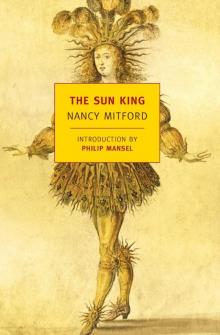 The Sun King
The Sun King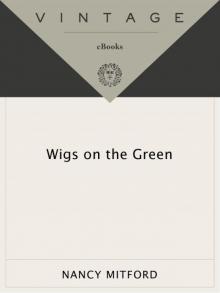 Wigs on the Green
Wigs on the Green Love in a Cold Climate
Love in a Cold Climate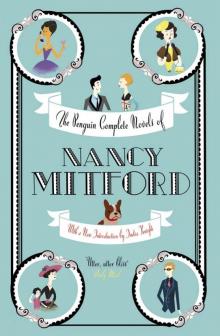 The Penguin Complete Novels of Nancy Mitford
The Penguin Complete Novels of Nancy Mitford The Pursuit of Love
The Pursuit of Love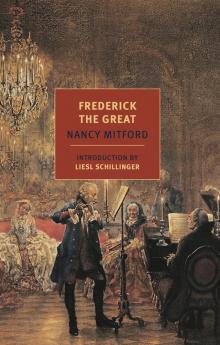 Frederick the Great
Frederick the Great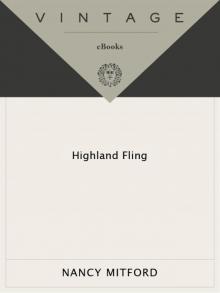 Highland Fling
Highland Fling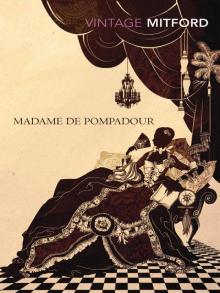 Madame de Pompadour
Madame de Pompadour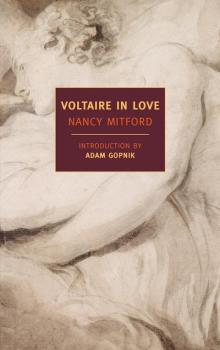 Voltaire in Love
Voltaire in Love Don't Tell Alfred
Don't Tell Alfred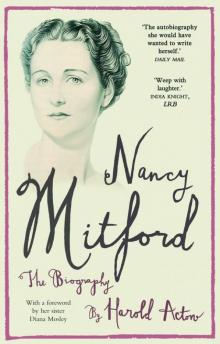 Nancy Mitford
Nancy Mitford Christmas Pudding and Pigeon Pie
Christmas Pudding and Pigeon Pie